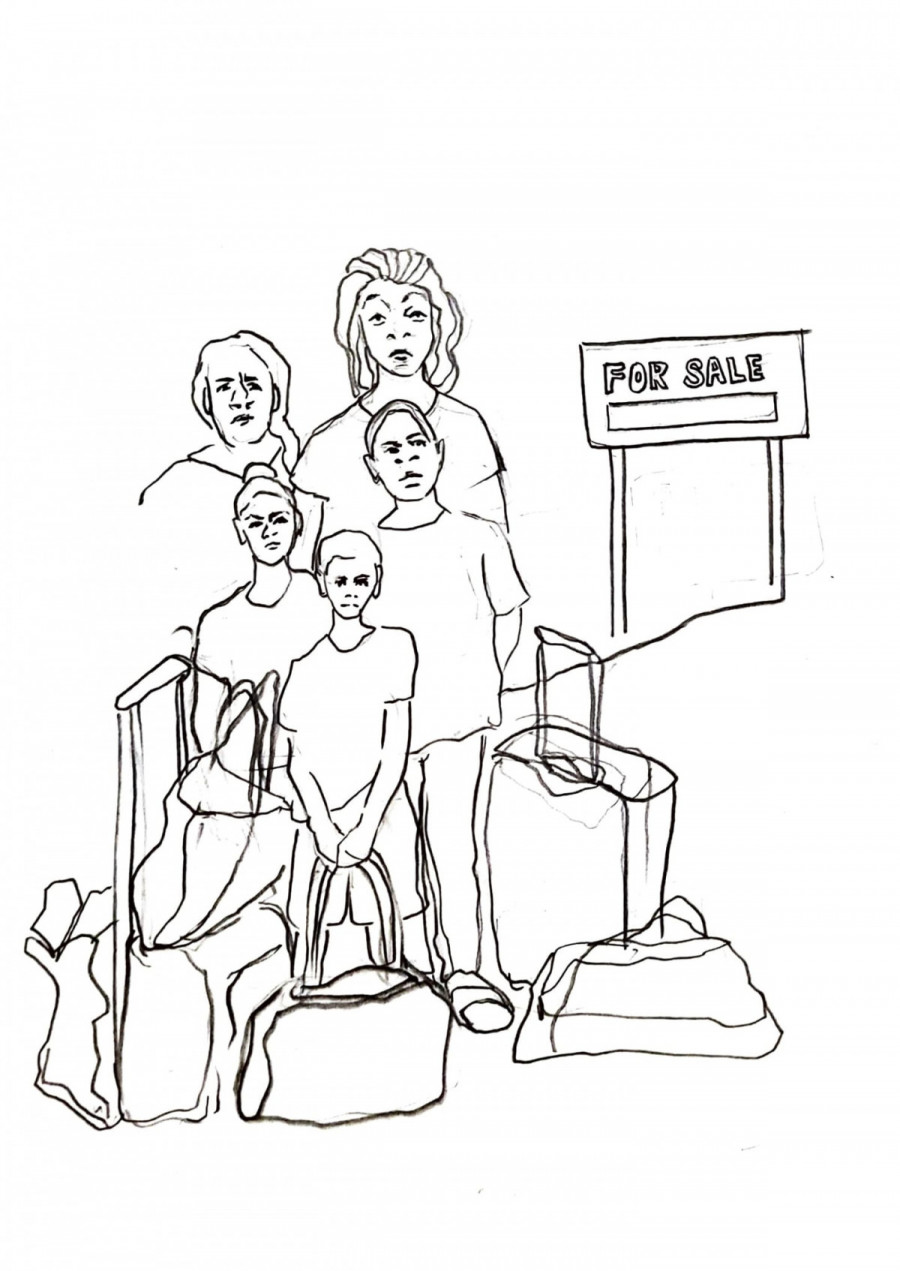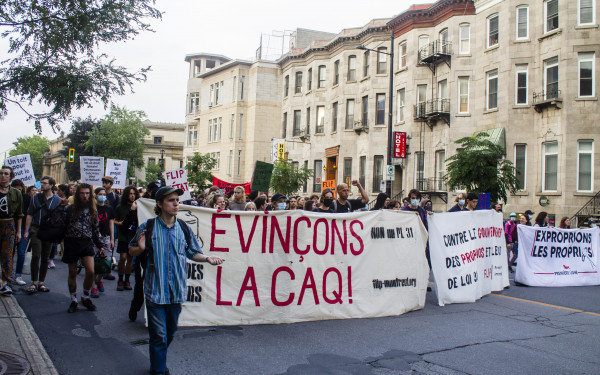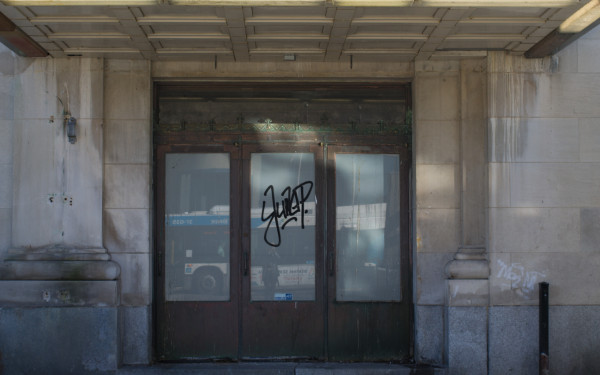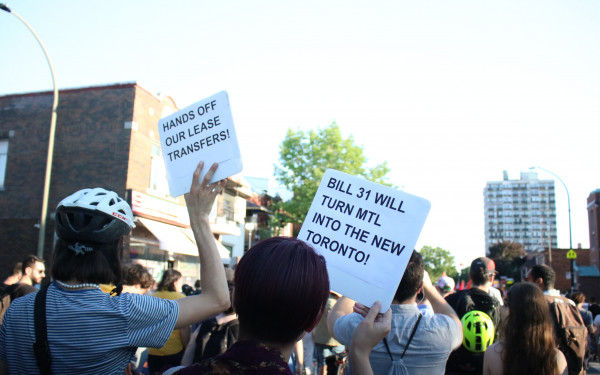Parc-Ex: A testimony of Montreal’s housing crisis
Immigrant communities are most vulnerable to gentrification and discrimination, tenant unions say
Parc-Extension, a borough with a rich history, characterized by a predominantly working-class population and vibrant immigrant communities, has traditionally faced economic challenges.
Amy Darwish, a worker at Comité d’Action de Parc-Extension (CAPE), said that immigrant tenants in the area are being hit the hardest by the housing crisis, as Parc-Extension is one of the neighbourhoods in the city that is commonly subjected to gentrification and the housing crisis.
According to Darwish, a major cause of gentrification in Parc-Extension was the arrival of the Université de Montréal (UdeM) campus. There was an enormous amount of pressure put on tenants as a result, seen in the form of abusive rent increases, evictions and intimidation from landlords, she explained. The arrival of the campus in 2019 brought an influx of amenities catering to wealthy students, “which incentivized landlords to force out long-term tenants and rent out at much higher rates,” Darwish said.
Beyond the construction of the UdeM campus as a sign of gentrification in Parc-Extension, renting a place to live in is proving to be a hurdle in itself. According to a 2021 survey conducted by the Regroupement des comités logement et associations de locataires du Québec (RCLALQ), several barriers stand in the way of finding housing for Parc-Extension residents. With most rental listings being posted exclusively online, those with limited internet and digital access are left unable to access the advertisements.
“You used to be able to find apartments in adjacent neighbourhoods,” said Darwish. “But what we're seeing now is that people are being pushed off the island altogether.”
In addition, several tenants experienced being turned away from possible housing in discriminatory ways. The survey found that tenants with children, foreign accents, who are single women, and individuals with “non-Quebecois” names are more likely to be rejected from renting.
“[The housing crisis] disproportionately affects immigrants, women, single parents, elderly people; and people who don’t have the financial, organizational [means], or time to be able to fight back,” said Melissa Simard, a member of the Montreal’s Autonomous Tenant Union (MATU), a non-hierarchical tenant union.
RCLALQ member Cédrick Dussault explained that, “[recent immigrants] are targets for eviction because they do not know their rights, as well as people who were here for a long time.”
Tenants who find themselves in discriminatory situations may fight for their rights, but must do so through the Régie du logement. The process however, like the listings, is often done online or over the phone, and may only be done in French or English. Additionally, some tenants may not know this service is available to them.
Despite discrimination in housing being forbidden by law, Dussault added that “landlords can just pick and choose who to accommodate.”
Darwish echoed Dussault’s sentiment. “[Discrimination] is very much triggered by the arrival of whiter, wealthier residents into the neighbourhood,” said Darwish. “We see a lot of landlords who are flat out refusing to rent to immigrants and are openly expressing preferences.”
Simard believes harmful stereotypes carried out against marginalized communities, including assumptions about their lifestyle and economic contributions, foster more barriers within the housing market.
The issue is also intertwined with unstable legal statuses. Renting while undocumented makes it more difficult to fight for housing rights for fear of being denounced to immigration by landlords. “Having precarious immigration statuses is something that complicates people's capacity to navigate a housing crisis,” Darwish said.
Montreal has also become a hot real estate market, suitable for speculation—an investment method among properties in which investors expect high rates of return quickly.
Dussault explained that ‘speculation’ drives landlords to make the most profit possible, in places that were originally cheap and affordable, with inexpensive buildings, slowly but surely rendering all sectors of Montreal with exorbitant rents.
The issue is additionally apparent at the provincial level, according to tenant union associations. “This is probably the most severe housing crisis that we've had in the province,” Dussault said.
“Basically, there is no control on the price of rent,” he added. “When there is a change in tenant, the landlord can dictate the price they want.”
While tenant rights exist in the Code civil du Québec, Dussault believes they are not sufficiently protected, and landlords do not face major consequences when bending the rules.
In the summer of 2023, a landlord in the Notre-Dame-de-Grâce neighbourhood attempted to bypass “tribunal rules” by giving money to their tenants in exchange for their eviction.
The tribunal rules in question refer to the Tribunal administratif du logement. Darwish said she’s seen several other cases like these in Parc-Extension.
“You see many instances where landlords say they’re going to get permits to renovate or are going to be moving in a family member, but it doesn’t end up happening, and they just rent to someone else for higher rates,” she added.
Every year, the tribunal publishes a suggested increase in rent prices for landlords to refer to in their own increases. However, according to the RCLALQ, they are not legally bound to follow this suggestion.
“For a long time, Montreal was considered more affordable than other cities in Canada, like Vancouver and Toronto, but data shows that we’re catching up,” said Dussault. In the last year alone, rent in Montreal rose by 16.4 per cent. According to statistics by the RCLALQ, the average monthly rent for a four-and-a-half apartment in Quebec went from $1,222 in 2020 to $1,504 in 2023. For more than three rooms, it amounts to almost $2,000 on average.
The reason for this bias towards landlords, according to MATU, is that government employees and ministers are part of the people who benefit from these systems. The Minister of Housing, France-Élaine Duranceau, is a former real estate agent.
“This is reflective of the ideas around housing and accessibility,” said Simard. “The government is encouraging the speculative real estate market.”
Dussault supported this statement. “It’s a matter of social class,” he said. “People who are in power come from backgrounds of real estate investors.”
Bill 31 is another barrier to housing accessibility for Montreal tenants. The bill, currently under review, would eliminate the possibility of lease transfers, and would consequently hit lower-income renters the hardest.
“Lease transfers were a way of keeping rents affordable and getting around housing discrimination in neighbourhoods,” Darwish said.
Simard believes lease transfers were an important tool for tenants. “They were kind of the last strongholds of tenants to be able to afford housing, and they're taking that away,” she said.
At the beginning of this year, another resource for tenants was shut down. AccèsLogis has served as the main provincial social housing program since 1997. According to the housing minister, the project was too outdated, and carried out too slowly.
To Darwish, these are all “concerted efforts by the Legault government to backtrack significantly on tenants’ rights.”
With files from Iness Rifay.
This article originally appeared in Volume 44, Issue 7, published November 28, 2023.







